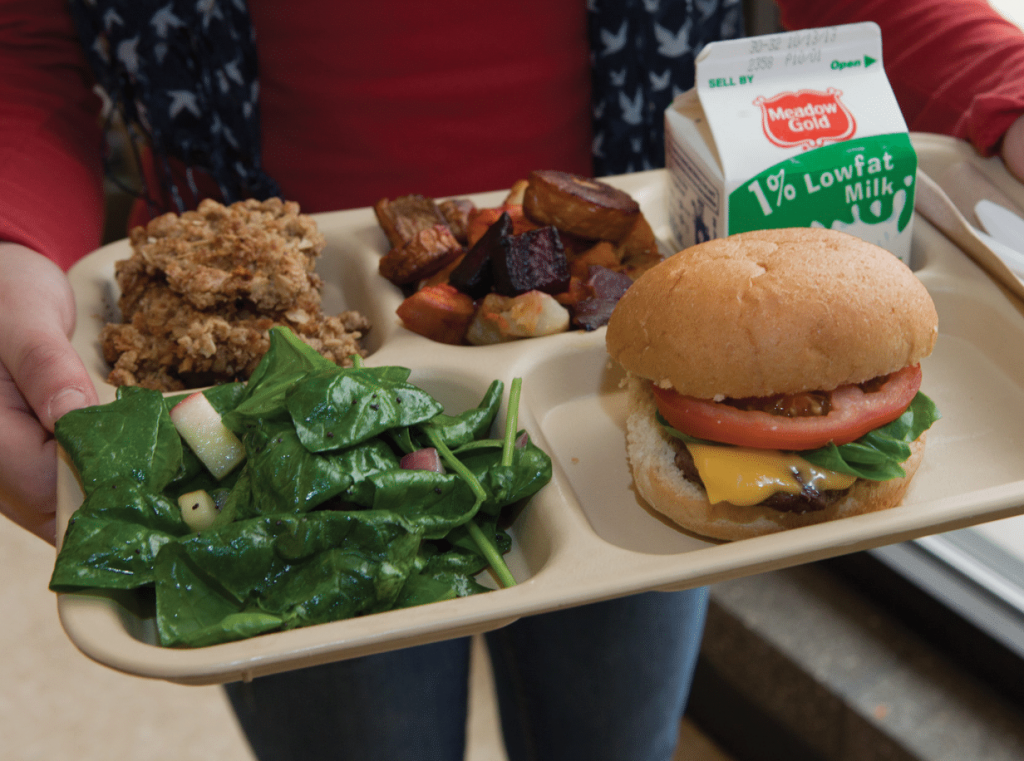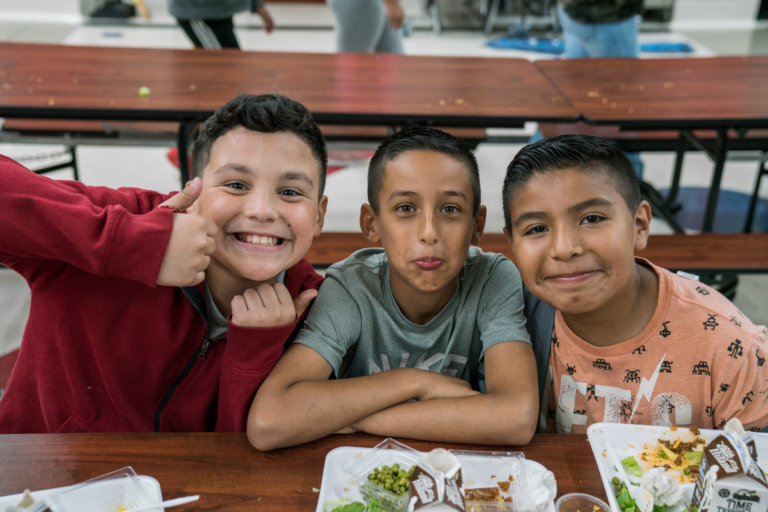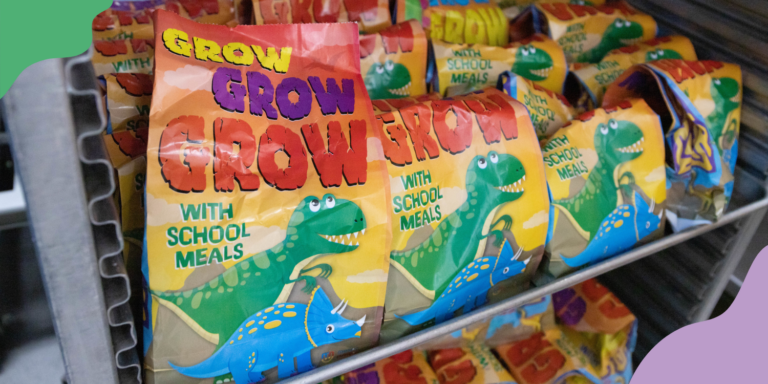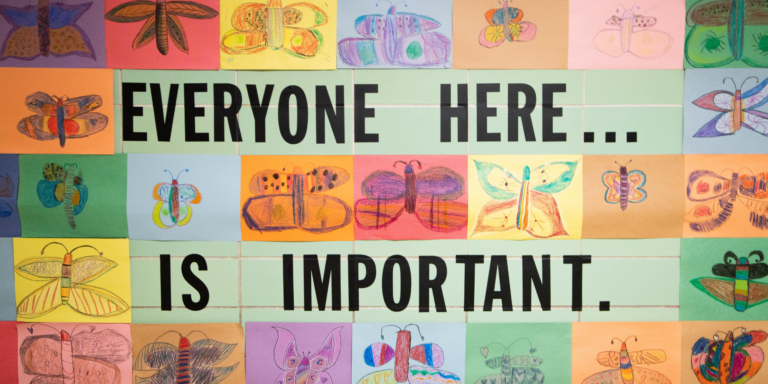Recapping #LunchChat: A Twitter Chat to Celebrate Healthy School Meals
More than 50 of you joined our Twitter #LunchChat about healthy school meals! Here are some of the highlights from our conversation.
More than 50 of you joined our Twitter #LunchChat about healthy school meals! Here are some of the highlights from our conversation.

Earlier this month, we partnered with the National Farm to School Network on a special Twitter chat celebrating healthy school meals. Together, we aimed to amplify the way that school meals can support our country’s recovery from COVID-19; how communities can support school meals; and champion the vision that all students deserve access to healthy food at school.
More than 50 organizations, school nutrition professionals, FoodCorps alumni, and partner nonprofits joined our conversation. Below are some highlights from the Twitter chat. Got a last-minute thought to add? Tweet us using the hashtag #LunchChat!
A1: #Schoolfood has also been essential for wider communities during the pandemic. Districts like @laschools & @BaltCitySchools are providing meals to anyone who’s hungry. Many others are helping distribute USDA Farmers to Families Food Boxes. https://t.co/fEzyhAgL5v #LunchChat
— National Farm to School Network (@FarmtoSchool) July 9, 2020
A1. School food programs are one of our nation’s biggest public health initiatives. They also represent one of our most successful public health programs. Healthier students are better learners! #LunchChathttps://t.co/ssecpPdOLn https://t.co/tsWph4wqi1
— SchoolLunch (@SchoolLunch) July 9, 2020
A1: School meals allow ALL students access to quality, nutritious meals. By serving meals in schools, we are reinforcing the fact that balanced nutrition is essential to learning. #lunchchat https://t.co/v07eJhElKx
— Rudd Center (@UConnRuddCenter) July 9, 2020
A1 #SchoolBreakfast & #SchoolLunch ensure every student is nourished & ready to learn. School meal programs have played a critical role in combating childhood hunger during the pandemic. #LunchChat pic.twitter.com/J0eHXaPJig
— Morgan McGhee, MPH RD (@speakingtheghee) July 9, 2020
A1 School food programs are essential for providing accessible & nutritious meals for children, esp low SES BIPOC children who come from communities systematically denied healthy foods due to #FoodApartheid. #LunchChat https://t.co/y4s02wIK4y
— Revolution Foods (@RevolutionFoods) July 9, 2020
Q2: #LunchChat Let’s advocate for #UniversalMeals FREE meals for all students K-12. Let’s advocate for more @FarmtoSchool funding through @USDA. Let’s advocate for HEROES Act funds to school food authorities and CACFP sponsors to support financial challenges. @eatrightPRO pic.twitter.com/laRzEQCEm9
— schoolmealsrock (@SchoolMealsRock) July 9, 2020
A2: School nutrition professionals are often hourly & among the lowest-paid school staff. As frontline workers (which they are, all of the time!), they deserve compensation & protections that reflect their essential contributions: living wages, paid sick time & PPE. #LunchChat https://t.co/fAuES46MEk
— National Farm to School Network (@FarmtoSchool) July 9, 2020
Heroes also need time to replenish. They have been working so hard for so long – it wears on them. As we ramp up for the new school year let’s think about ways we can protect their well-being with PPE, time off, and supplementing/building the school prof.’s capacity #LunchChat https://t.co/Ohalb300sK
— No Kid Hungry Georgia (@NoKidHungryGA) July 9, 2020
A2: We can support school nutrition professionals by amplifying how they go above and beyond to keep our students fed day after day ❤️ #Trayblazers #thankyou #LunchChat https://t.co/zCJZbYMBSE
— GeneralMillsCF (@GeneralMillsCF) July 9, 2020
A2 @amyro55 and I have thoughts on this! In this @USATODAY opinion piece we lay out what the federal government and school employers should be doing to support them. spoiler alert: fair wages, benefits, and safety protections, and RESPECT! #LunchChat https://t.co/TxaOtUCRMx
— Jennifer E. Gaddis (@JenniferEGaddis) July 9, 2020
A3. School meals provide a critical safety net for families suffering from food insecurity. #lunchchat @fractweets https://t.co/ym3gTtdR6A
— Nancy Brenowitz Katz (@NancyBKatzRD) July 9, 2020
A3: School meals provide a layer of #foodsecurity for students who don’t have enough food at home. Access to food via schools plays a critical role in how well families are able to withstand the impacts of #COVID19. #LunchChat https://t.co/23fgcSRaid
— 88 Acres (@88acresfoods) July 9, 2020
A3: School meals are not only key to ensuring students have food and parents have their costs and labor minimized, but creative community partnerships for expanding school food through local businesses can be a critical economic driver! #LunchChat https://t.co/ttn3yzn6H7
— Elijah’s Promise (@ElijahsPromise) July 9, 2020
A3: School districts maintain significant buying power within the food system, so they continue to support the economy. Additionally, they’re providing thousands of free meals when schools and restaurants are not open. #CookingForLife #LunchChat https://t.co/poupEtFDaE pic.twitter.com/vwnS3aWZmi
— Common Threads (@Common__Threads) July 9, 2020
A3: School meals sourced from local farmers can support communities as they recover from COVID-19 and provide an essential safety net for many families. #LunchChat https://t.co/DAjEUhUbAS pic.twitter.com/DeJsLJLgZy
— CenterForEcoliteracy (@Ecoliteracy) July 9, 2020
A4: Policy solutions like expanding SNAP benefits and extending P-EBT through the summer can go a long way towards ensuring that our most valuable communities have access to adequate food and nutrition. #LunchChat
— TeensforFoodJustice (@tffjinitiative) July 9, 2020
A4: Our nation should invest in universal school meals that drive values-based purchasing: providing fresh, nutritious food to every kid while directly transforming our food system to be centered on racial & social equity. More on that here→ https://t.co/bbwm541FqM #LunchChat pic.twitter.com/4qgICOhBL6
— National Farm to School Network (@FarmtoSchool) July 9, 2020
A4: The answer is simple: UNIVERSAL SCHOOL MEALS #lunchchat https://t.co/OsqSSIZbLc
— SFUSD Student Nutrition Services (@SFUSDSchoolFood) July 9, 2020
A4.1 Nearly 4 in 10 Black & Hispanic households w/kids are struggling with food insecurity during #COVID19, say @dwschanz and @hbottemiller. School meals can help reduce food insecurity for these families. #LunchChat
— Food Research & Action Center (@fractweets) July 9, 2020
A4: Globally, diet-related chronic diseases are the leading cause of death, and children consume one-third to one-half of daily calories during the school day. School meals for all can reduce food insecurity and promote good health. #LunchChat https://t.co/rq5S5Cvvns
— CSPI (@CSPI) July 9, 2020
A5: Representation. Literally giving kids a seat at the table. And staff. BIMPOC kids. BIMPOC staff. How can we create the next generation of healthy eaters when we aren’t even asking them what they like?! #QTNA #lunchchat https://t.co/nLVJEyAB9w
— Morgan McGhee, MPH RD (@speakingtheghee) July 9, 2020
A5. All along the school food supply chain are points to leverage racial justice. Procurement from sustainable agriculture, the working conditions of not only those who farm and but also the bus drivers, warehouse staff and the school nutrition staff. #LunchChat https://t.co/M83l7wAHCo
— No Kid Hungry California (@NoKidHungryCA) July 9, 2020
A5.1: Food is a basic human need, and addressing hunger helps promote a more level playing field for our children. Regardless of ZIP code, students should have access to nutritious meals. Deploying resources to the greatest areas of need is critical. #CookingForLife #LunchChat https://t.co/tOCUEHbgTU pic.twitter.com/UK66J5wVJ3
— Common Threads (@Common__Threads) July 9, 2020
A5. Food justice and racial justice go hand in hand! POC are most severely impacted by hunger and poor food access. School food is an avenue through which we can accomplish food justice by ensuring all children have access to nutritious meals. #LunchChat https://t.co/LvHwaX4LHi
— Rudd Center (@UConnRuddCenter) July 9, 2020
A5: School food is intertwined with so many aspects of our communities & society – families, education, agriculture, public health, economy, environment. Centering #schoolfood on racial justice ripples out far beyond the cafeteria. #LunchChat https://t.co/TlfYUakaQY
— National Farm to School Network (@FarmtoSchool) July 9, 2020
A6: Millions of children relied on school meals prior to the pandemic, and many more will come to depend on them come fall. Schools need the ability to feed ALL students at no charge through income eligibility waivers & #UniversalFreeMeals in the upcoming school year! #LunchChat pic.twitter.com/HGKIngDBKI
— Shannon Newerth-Henson (@Shannon_Newerth) July 9, 2020
A6: Extend & expand Pandemic-EBT, which can provide the value of missed school meals as a grocery voucher. In addition to those eligible for free- and reduced-price meals, the program should be expanded to children 0-5. https://t.co/xIJHowPmtQ #LunchChat pic.twitter.com/ShJ2vEsr8x
— Urban School Food Alliance (@urbanschoolfood) July 9, 2020
A6 Listen to our School Lunch Heroes. Listen to our students. Listen to our Nutrition Directors. Listen to our FoodCorps Service Members. #LunchChat https://t.co/UlOsMjSW8d
— Lauren Bauer (@laurenlbauer) July 9, 2020
A6: On our way to #UniversalSchoolMeals, we need *all* USDA waivers to be extended to allow for flexible meal service during COVID-19. In addition, Congress should reup #PEBT, boost #SNAP, and provide additional funding for school meal programs. #lunchchat https://t.co/xfYukVj9OH
— SFUSD Student Nutrition Services (@SFUSDSchoolFood) July 9, 2020
A6 Policymakers can ⬇️ strain on school meal prgms by helping school dist recover unreimbursed costs & identify add. funding while addressing other methods of supporting children/families (i.e. expanding Pandemic EBT prog & ⬆️ SNAP benefits). #LunchChat https://t.co/09JlxbEvwP https://t.co/J194Mv7ekX
— The Praxis Project (@Praxis_Project) July 9, 2020
A6: Policymakers can ensure school meals are set up for success by allocating funding for equipment, training and costs associated with meal delivery. #LunchChat #eatrightPRO https://t.co/AafZoCqfZc
— eatrightPRO (@eatrightPRO) July 9, 2020
A7: A world with universal free school lunch would look like kids eating without worry of embarrassment, parents feeling supported in times of need, and more funding toward education programs + extracurricular activities. #LunchChat #SchoolLunchForAll https://t.co/j9pZzVIVtK
— School Lunch For All (@EndLunchDebt) July 9, 2020
A7: #UniversalFreeMeals would make school meals part of education. The cafeteria could be the biggest classroom in the school. Mealtime = learning opportunities. #LunchChat https://t.co/jd8qtZaXnl
— CenterForEcoliteracy (@Ecoliteracy) July 9, 2020
A7: A world with universal free school meals could mean every student is receiving the nutrients they need to succeed. Children would also have more time to eat and make important social connections, and school meal programs could be well-funded and valued. #LunchChat https://t.co/5m1mahtpXJ
— American Heart Advocacy (@AmHeartAdvocacy) July 9, 2020
A7: I’ll never forget the look on this students face when we rolled out #BIC in Riverside USD. He said, “you mean, we get breakfast EVERYDAY?!” My heart broke into a million pieces. School food is essential everyday. Periodt. #lunchchat #universalschoolmeals https://t.co/5Fq6lyEw4F
— Morgan McGhee, MPH RD (@speakingtheghee) July 9, 2020
A7 #lunchchat Universal free lunchrooms would be free of stigma & bullying. https://t.co/HgnWSz39ss
— LG_SchoolFood (@LSchoolfood) July 9, 2020
A7: Offering #UniversalFreeMeals to all students would reduce the burden on families and CNPs alike and allows districts to feed all students at no charge to ensure they are nourished and ready to learn. This looks like more eating and less paperwork/stigma/stress! #LunchChat
— DC Greens (@dc_greens) July 9, 2020
A8: Contact your Senators to urge action on COVID relief for school meals, schools & ECE providers, and farmers. The Senate is working on priorities for the next round of COVID legislation and they need to hear from you! Let them know what your community needs. #LunchChat pic.twitter.com/PJ5u9RQXjz
— National Farm to School Network (@FarmtoSchool) July 9, 2020
A8: Be our guest!! We are funded by participation, come enjoy a meal with us! #LunchChat pic.twitter.com/QIILOKg9tm
— Adam Russo (@theadamrusso) July 9, 2020
A8: The landscape of school meals has definitely changed but together we can keep the conversation going and advocate for our nation’s kids, for our School Food Heroes. Universal free school meals for ALL! #LunchChat
— Jenny Devivo (@jdevivomv) July 9, 2020
A8: Many things, but one that’s easy: spread the word about #schoolmeals! Too many people still think the majority of school food is processed junk—it’s not! Our nation’s school food professionals are doing what they can to NOURISH students. Share their amazing work! #lunchchat https://t.co/MFd7settLz
— Chef Ann Foundation (@ChefAnnFnd) July 9, 2020
A8: Schools receive funding based on the # of meals they serve to kids. Encourage kids to eat the breakfast & lunch that school provides more often. Thank your local school nutrition heroes and share the awesome work they’re doing. #LunchChat https://t.co/YNyXEKB9in
— 88 Acres (@88acresfoods) July 9, 2020

Harris v. Trump: Who Will Put Children First?

The Policy Brief, Summer 2024: Why Summer EBT Matters

3 Inspiring LGBTQ Food and Farming Orgs to Know